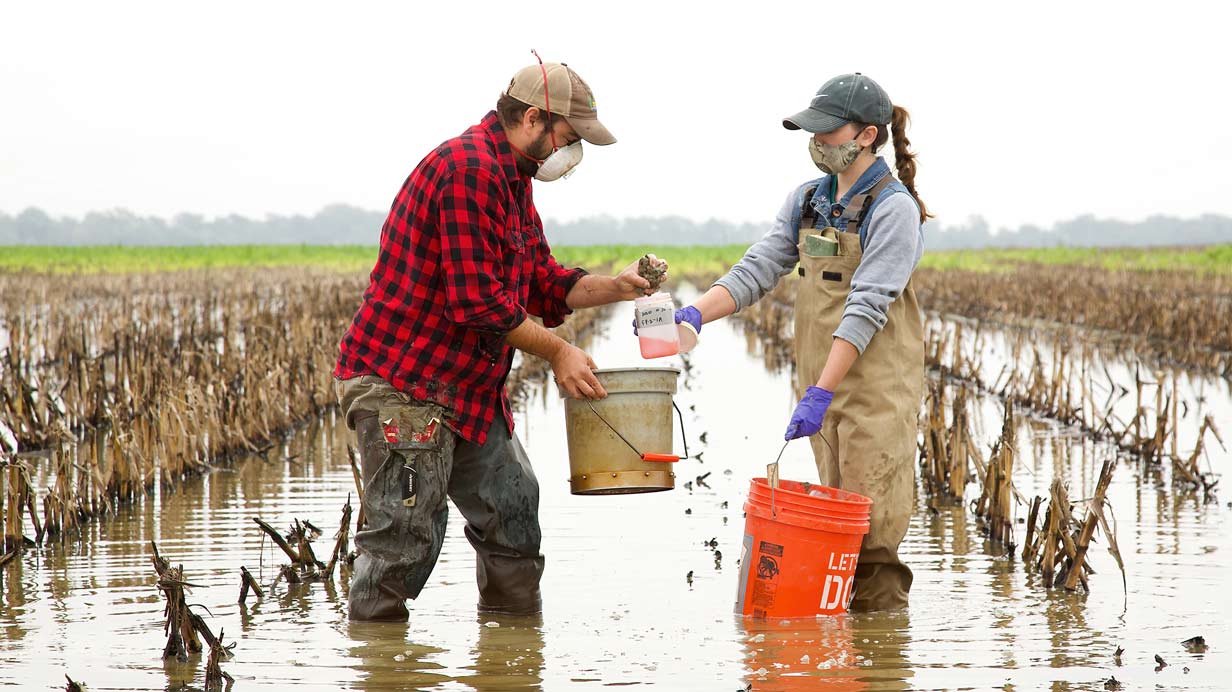Biological Science, M.S.
Prepare yourself for a career teaching biology or participating in diverse fields of biological research.

About the Master of Science in Biological Science
The Department of Biology in the College of Liberal Arts offers the M.S. in Biological Science. This degree prepares students for various academic, industrial, or government positions that include but are not limited to those involving freshwater biology, medicine, education, molecular genetics, ecology and conservation biology.
A diversity of courses and a great variety of habitats in north Mississippi provide opportunities for both laboratory and field studies, including a 740-acre field station, a national forest, and flood-control reservoirs.
Accelerated Master's Degree
Undergraduate biology majors who have completed 90 credits as an undergraduate with a GPA of 3.0 or greater can begin earning credit toward an M.S. in Biological Science. Once accepted into the program, students can earn the M.A. in only one additional year of graduate work after completion of the B.A. or B.S. degree.
On this Page…
Program Information
Degree
M.S. in Biological Science
Required Credit Hours
30
Program Type
Master's Program
Program Location
School
Duration
2 years
Graduate Program Coordinator
If you have any questions about the M.S. in Biological Science, don’t hesitate to get in touch!
Jason Dale Hoeksema
Professor of Biology, Associate Chair and Graduate Program Coordinator
M.S. in Biological Sciences Program Details
Learn about the application process, academic requirements, financial support, and the facilities available to you.
APPLICATION DEADLINE: January 15
The Department of Biology welcomes applications to the M.S. program from students who have identified a member of the graduate faculty to be their major advisor.
Students in the M.S. program complete a minimum of 30 credit hours with a minimum cumulative average GPA of 3.0. Students can choose a thesis or non-thesis option.
Thesis Option:
- a minimum of 24 credit hours of graduate courses, of which 18 credit hours must be formal classroom courses
- 6 thesis hours
- Bisc 691: Seminar
Students pursuing the thesis option must satisfactorily complete a research prospectus, thesis based on potentially publishable research, and one seminar on their research.
Nonthesis Option:
- a minimum of 30 credit hours of graduate courses, of which 24 credit hours must be formal classroom courses
Students in the Department of Biology's thesis Master's program who choose the thesis option are typically supported through departmental teaching assistantships or through research assistantships from individual faculty.
These assistantships can include the following:
- in-state tuition
- tuition scholarship
- teaching stipend
- subsidized health insurance
The department also provides a few scholarships based on academic excellence. For more information, visit Graduate Programs in the Department of Biology.
The Graduate School's financial aid webpage also lists a variety of funding possibilities.
The Department of Biology occupies Shoemaker Hall, a five-story building on the main Oxford campus that includes the Pullen Herbarium and other scientific collections. Individual research faculty occupy laboratories that are equipped with instrumentation and facilities to support a range of life sciences research from molecular and cell biology through ecosystem ecology.
Biology research is supported, among others, by
- the University of Mississippi Field Station that is 11 miles from the main campus and encompasses over 700 acres of forests, wetlands, and grasslands, over 200 experimental pond and streams, and houses the Center for Water and Wetland Research,
- nearby Holly Springs National Forest, which includes the Tallahatchie Experimental Forest and Strawberry Plains Audubon Center,
- UM Libraries, including a dedicated Science Library, and
- the Mississippi Center for Supercomputing Research.
Biology faculty and students collaborate with a number of units on and off campus, including
- National Center for Physical Acoustics,
- Research Institute for Pharmaceutical Sciences,
- National Center for Natural Products Research,
- School of Engineering,
- National Center for Computational Hydroscience and Engineering,
- Department of BioMolecular Sciences in the School of Pharmacy,
- USDA National Sedimentation Laboratory,
- Mississippi Department of Wildlife, Fisheries, and Parks, and
- University of Southern Mississippi Gulf Coast Research Laboratory.
Department of Biology
Department Video
Hear from students and faculty about our department.
Next Steps
Explore Affordability
We have a variety of scholarships and financial aid options to help make college more affordable for you and your family.
Apply to the University of Mississippi
Are you ready to take the next step toward building your legacy?
